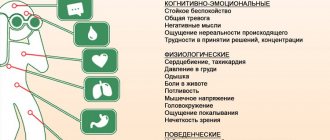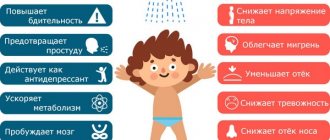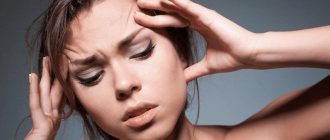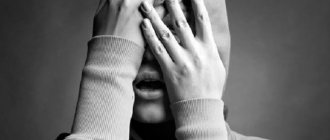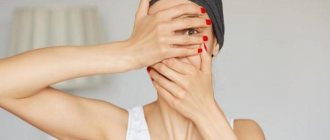Panic attacks can occur both during the daytime while awake and in the middle of the night while sleeping. The pathology is a psychosomatic disorder and, with proper treatment, is completely reversible. Night attacks occur in approximately half of patients suffering from VSD and neuroses. Panic attacks at night significantly disrupt the quality of sleep, worsening a person’s overall well-being. As they progress, new phobias may arise, for example, fear of falling asleep itself. What is the cause of PA at night, what are the symptoms of attacks and how can you get rid of them - we discuss important issues in detail.
Panic attack in a dream - symptoms
Depending on the severity of the vegetative crisis and the characteristics of the person’s psyche, a panic attack during sleep can have symptoms of varying intensity. The manifestations of the attack themselves, their duration and severity also differ. For some, the symptoms are more of an emotional nature (fears, anxiety), for others there is a bias towards physiology.
Important!
Panic attacks may hide other serious diseases, especially those related to the endocrine system. Only a doctor can make an accurate diagnosis and prescribe the correct treatment! All information on the site is for informational purposes only and is not a reason for self-diagnosis or self-medication.
The main symptoms of nighttime panic attacks:
- A feeling of danger, strong fear for one’s condition, fear of death, madness, unreasonable anxiety, a feeling of horror, anxiety, obsessive thoughts.
- Blurred consciousness.
- Tremor of the limbs, trembling in the body.
- Tachycardia, arrhythmia.
- Pain in the heart and left side of the chest.
- Lump in throat, difficulty swallowing.
- Lack of air, difficulty taking a full breath, shortness of breath.
- Dry mouth.
- Increased sweating.
- Chills, cold extremities.
- Numbness in the arms or legs.
- Gastrointestinal disorders (spasms, pain, nausea, diarrhea).
- Headache, dizziness.
- Vaginal legs, muscle weakness.
- Body heat, increased temperature.
- Increased or jumping blood pressure.
- Temporary paralysis of the body.
- Derealization.
- Depersonalization.
Atypical symptoms of nighttime PAs
The following symptoms are observed in patients much less frequently, but can still occur during panic attacks not only during sleep, but during the day:
- Deterioration or temporary loss of vision.
- Loss of voice.
- Impaired coordination of gait and movements.
- Fainting.
- Cramps.
Panic attacks can develop right in the middle of sleep - a person suddenly wakes up with a strong feeling of anxiety, palpitations, sweating and other symptoms. PA also occurs before falling asleep. Typically, a person suffering from neurosis begins to scroll through anxious thoughts in his head while lying in bed, fixates on negative events, and gradually feels a deterioration in his condition.
Reasons why panic attacks occur at night
In fact, panic attacks at night are no different from attacks that occur at other times of the day. In psychology there is a term “conditioned reflex”. According to the data studied, PA often occurs in people at the same time or in certain environments.
The development of conditioned reflexes is a feature of the psyche not only of humans, but also of most animals. The brain remembers the circumstances in which a threat to life occurred (and this is exactly how it perceives PA) and instinctively reacts, finding itself again in the same conditions. Therefore, it is not surprising if attacks occur at approximately the same time during the night for the sufferer.
Treatment options
To successfully get rid of the problem, you need to use complex therapy. Only a combination of psychotherapy, drug treatment, and physiotherapy will produce results. Panic attacks need to be treated from the moment they first appear.
For drug therapy, antidepressants, tranquilizers, and B vitamins are prescribed. All this helps restore the body’s functioning and relieve symptoms of attacks.
Important! Drugs should only be prescribed by a doctor, since increasing the dose of drugs will lead to negative consequences.
Psychotherapy is aimed at identifying the causes of the disorder and working through the problem. A specialist shows a person how to deal with attacks. Physiotherapy is massage, exercise and other procedures. Their goal is to strengthen and relax the body.
Anxious dreams and panic attacks
People with high anxiety often have bad dreams. Many people mistakenly believe that panic attacks at night occur from bad dreams - a person has a nightmare, he wakes up in sweat, with increased heartbeat, fear, and rapid breathing. But in fact, frequent bad dreams are a consequence of neurotic disorders and PA, not their cause.
It turns out to be a vicious circle - you have a bad dream - you have a panic attack. After an attack, there is a high probability of having a bad dream again. All this leads to even greater weakening of the nervous system, insomnia, and asthenia. Efficiency, attention, and concentration decrease. The quality of life deteriorates significantly.
Causes
The mechanism behind the formation of panic attacks is not yet known. There is a theory that an attack is provoked by negative thoughts that provoke the release of adrenaline. The growth of the hormone in the blood leads to increased heart rate, breathing, and increased blood pressure. Adrenaline blocks the receptors responsible for inhibition, and excitement, anxiety, and fears increase. During an attack, a person may be afraid of losing consciousness, which leads to dizziness and numbness of the limbs.
The following reasons can also provoke attacks:
- heart attack;
- cardiac ischemia;
- childbirth, pregnancy;
- menopause;
- an adrenal tumor that interferes with the synthesis of adrenaline;
- thyrotoxic crisis;
- thyroid diseases;
- long-term therapy with hormonal drugs;
- severe stress;
- hereditary history of anxiety or mental disorders.
Provoking factors
In addition to the reasons that directly change the functioning of the autonomic system and the release of adrenaline, norepinephrine, and dopamine, there are also risk factors that increase the likelihood of a panic attack in a healthy person. These include:
- drug and alcohol abuse;
- lack of physical activity – physical inactivity leads to restlessness, impulsiveness and panic attacks;
- smoking;
- chronic lack of sleep;
- constant suppression of emotions.
Nocturnal attacks of PA and obsessions
Almost all people who regularly suffer from panic attacks, whether in me or during the day, become susceptible to obsessions - obsessive thoughts. Sometimes compulsions are added to them - involuntary obsessive movements and behaviors. The condition is characterized as obsessive-compulsive disorder - a more complicated course of neurosis.
The most common obsessive thoughts and fears during nighttime panic attacks are:
- Fear of death.
- Fear of suffocation or death from a heart attack.
- Hypochondria (fear of serious illnesses).
- Fear of going crazy.
- Feelings of loneliness and helplessness.
- Constant thoughts “I’m not like everyone else.”
- Fear of embarrassing yourself among people.
- Fear of being in serious condition and far from medical care.
All these thoughts take on an obsessive form and literally torment a person day and night. It seems to a neurotic that they are completely unable to control them. They, in turn, give rise to new attacks of panic attacks and increase the feeling of constant anxiety. Life turns into a real nightmare, from which there seems to be absolutely no escape.
Consequences
Panic attacks significantly worsen a person’s quality of life and, if left untreated, can cause the following complications:
- self-isolation, fear of society, interruption of contacts with other people;
- decreased self-esteem;
- loss of confidence in the future;
- wariness, anxiety, which can provoke aggression towards the environment;
- sexual dysfunction;
- the formation of mental disorders with frequent repetition of attacks;
- conflicts in the family;
- problems at work, study;
- abuse of alcohol and drugs to combat panic;
- exacerbation of chronic diseases;
- disorders of the digestive tract, dystrophy due to refusal to eat due to anxiety;
- fear of death.
Are panic attacks at night dangerous?
PAs themselves do not pose a serious threat to physical health. But they significantly worsen the psychological. If attacks occur frequently and a person is constantly in a state of heightened anxiety, somatic disorders and diseases may gradually develop, such as:
- Cardiac ischemia.
- Insufficient blood circulation.
- Hypertension.
- Gastritis and stomach ulcers.
- Cholecystitis.
- Hormonal disorders.
- Vascular atherosclerosis.
- Thrombosis.
- Diabetes.
- Heart attack, stroke.
The risk of developing such diseases increases if a person remains in a state of psychoneurotic disorder for too long (5-7 years or more) and does not make any attempts to get rid of it.
Online search for psychotherapists in any city in Russia
Treatment of nocturnal panic attacks
Any neurotic disorder requires an integrated approach. Treatment of panic attacks during sleep can be divided into 3 main stages, complementary to each other. Taken together, they give fairly fast and effective results.
Drug therapy
Any medications, their dosage, and duration of use can only be prescribed by a specialist. For a patient suffering from nighttime panic attacks, the doctor may prescribe the following types of medications:
- Sedatives (sedatives) on a plant and synthetic basis.
- Tranquilizers, to suppress excitation processes in the cerebral cortex and reduce anxiety.
- Sleeping pills (if chronic insomnia is observed).
- Antidepressants to improve the psycho-emotional state of the patient.
- Neuroleptics (prescribed in severe cases).
- Nootropics (improves cerebral circulation, cognitive functions).
- Vitamin to replenish substances that strengthen the nervous and cardiovascular systems.
It is important to understand that there are no medications that can cure panic attacks. All of the listed groups of medications relieve symptoms, stop attacks, but do not get rid of their cause. Therefore, treating nighttime panic attacks with medications cannot be considered the best and absolutely effective way. Often, after stopping the drugs, the attacks return.
Physiotherapy
Physiotherapeutic procedures are a fairly effective way to treat PA:
- Massage.
- Manual therapy.
- Acupuncture.
- Sharko's shower.
Experts believe that physiotherapy is necessary for 60% of patients treated in hospitals, 80% of patients treated in clinics, and for all, without exception, visitors to sanatoriums. Especially those patients whose diseases are related to the nervous system or are psychosomatic.
Physiotherapy is an additional treatment method that can speed up a person’s recovery from VSD and panic attacks during sleep by 1.5-2 times, reduce the risk of side effects and reduce the threat of relapses.
Physiotherapy methods activate the body's internal reserves and its protective and compensatory abilities. A properly prescribed procedure in many cases makes it possible to reduce the dosage of medications.
Psychotherapy
Psychotherapy sessions are considered one of the most effective methods for permanently getting rid of panic attacks, regardless of the time of their onset. In the course of such work, a person manages to discover the true causes of anxiety, neurosis, and PA, and eliminate them.
In psychotherapy, methods such as:
- Hypnotherapy.
- Gestalt therapy.
- Cognitive behavioral psychotherapy.
After psychotherapeutic sessions, clients gain a new perspective on things, new ways of acting. They begin to cope better with life, stress and emerging challenges.
Interesting facts about psychotherapy:
Fact 1
Many people think that a psychotherapist sees through people and is afraid to appear before them with their “sins.” In fact, the psychotherapist does not expose the client’s secret sins, but opens up to him, tries to understand and feel his state and emotions, and then talks about his vision of the situation.
Fact 2
A psychotherapist-psychologist has no right to prescribe medications; his task is to treat with words. Therefore, you should not be surprised when encountering such specialist psychologists as: Gestalt therapist, existential therapist, art therapist.
Fact 3
The most famous, most respected psychotherapist in the world will not help you, or will help you little, if you do not agree with him. Trust and relationship between the patient and the doctor are the basis of psychotherapy.
When can you expect another attack?
There is a greater likelihood of developing a panic attack in cases where the process of excitation and inhibition of certain parts of the nervous system is disrupted. If a person drinks coffee uncontrollably, especially in the mornings and evenings, before going to bed, there is a high probability of developing panic attacks.
A person can feel a panic attack coming due to the following symptoms:
- feeling of complete inactivity;
- the emergence of a need for immediate action (may manifest itself in body swaying, moving around the room, increased breathing);
- the appearance of chest pain (they may be mistaken for a pre-infarction condition).
We recommend reading: VSD and menstruation
Frequently being in situations with high stress, constant fear - all this can provoke evening anxiety, resulting in panic attacks that occur before bedtime.
Panic attacks have the following characteristics:
- Young people under the age of 35 are more susceptible to their occurrence.
- These manifestations occur at night, between 02:00 and 04:00.
- The average duration of a panic attack is 10-30 minutes. The peak of the attack overtakes a person within 5 minutes, and calming down can last from an hour to 5-6 hours, often not allowing him to fall asleep again and fully rest.
- After the panic ends, the person feels empty, overwhelmed, depressed and apathetic.
- Attacks can occur from 2-3 times a week to 1 time in six months. Bad thoughts and stress shorten the periods between the occurrence of subsequent attacks.
Preventing panic attacks during sleep
The following recommendations will help you get rid of night attacks faster and avoid relapses:
- Master at least one of the methods of deep relaxation (meditation, auto-training, breathing exercises).
- Reconsider your lifestyle, perhaps it is high time to make changes to it.
- Start doing any acceptable type of physical training (yoga, fitness, swimming, running).
- Eat right.
- Give up bad habits.
- Minimize stress in your life.
- Take a contrast shower, it strengthens blood vessels and relieves tension.
- Sleep at least 7 hours a day.
- Do not watch heavy films before going to bed, do not read the yellow press and news.
- Spend more time in the fresh air and take walks.
- Relax, go out into nature, do what brings you pleasure.
- Avoid physical fatigue.
- Take care of your physical health and treat somatic diseases in a timely manner.
